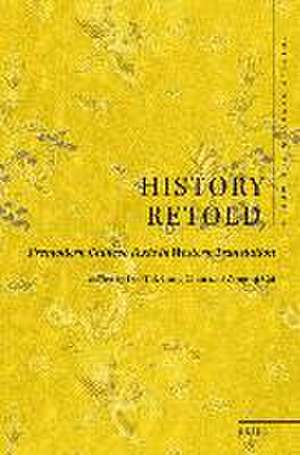History Retold: Premodern Chinese Texts in Western Translation: Chinese Texts in the World, cartea 2
Leo Tak-hung Chan, Zongqi Caien Limba Engleză Hardback – 28 sep 2022
Preț: 551.76 lei
Preț vechi: 672.88 lei
-18% Nou
Puncte Express: 828
Preț estimativ în valută:
105.60€ • 109.95$ • 89.24£
105.60€ • 109.95$ • 89.24£
Carte indisponibilă temporar
Doresc să fiu notificat când acest titlu va fi disponibil:
Se trimite...
Preluare comenzi: 021 569.72.76
Specificații
ISBN-13: 9789004521315
ISBN-10: 9004521313
Pagini: 235
Dimensiuni: 155 x 235 mm
Greutate: 0 kg
Editura: Brill
Colecția Brill
Seria Chinese Texts in the World
ISBN-10: 9004521313
Pagini: 235
Dimensiuni: 155 x 235 mm
Greutate: 0 kg
Editura: Brill
Colecția Brill
Seria Chinese Texts in the World
Notă biografică
Leo Tak-hung Chan is Junwu Distinguished Professor, Guangxi University, China. Besides articles in Harvard Journal of Asiatic Studies, The Translator, and other journals, he has authored seven books—Western Theory in East Asian Contexts (2020), Readers, Reading and Reception of Translated Fiction in Chinese (2010), Twentieth-Century Chinese Translation Theory (2004), The Discourse on Foxes and Ghosts (1998), Translation in the Post-Babelian Era (2020), and Translation, Adaptation, and Reader Reception (2020) [the last two in Chinese]—and edited One into Many: Translation and the Dissemination of Classical Chinese Literature (2003). He was 2017 CETRA Chair Professor of Translation, University of Leuven, Belgium, and 2018 Humanities and Social Sciences Prestigious Fellow (Hong Kong Research Grants Council).
Zong-qi Cai teaches at Lingnan University of Hong Kong and the University of Illinois at Urbana-Champaign. He has published thirteen scholarly books in English and five in Chinese, most recent of which are his monograph Grammar and Poetic Visions 語法與詩境 (2021), his edited volume How to Read Chinese Prose: A Guided Anthology (2022), and his co-authored volume (with Jie Cui and Liu Yucai), How to Read Chinese Prose in Chinese: A Course in Classical Chinese (2022) . He founded/cofounded and edits two Duke University Press journals, Prism: Theory and Modern Chinese Literature and The Journal of Chinese Literature and Culture (co-founded with Professor Yuan Xingpei), as well as the Chinese-language Lingnan Journal of Chinese Studies 嶺南學報.” He is also the general co-editor of the Brill book series Chinese Texts in the World, and as well as the Columbia book series How to Read Chinese Literature.
Zong-qi Cai teaches at Lingnan University of Hong Kong and the University of Illinois at Urbana-Champaign. He has published thirteen scholarly books in English and five in Chinese, most recent of which are his monograph Grammar and Poetic Visions 語法與詩境 (2021), his edited volume How to Read Chinese Prose: A Guided Anthology (2022), and his co-authored volume (with Jie Cui and Liu Yucai), How to Read Chinese Prose in Chinese: A Course in Classical Chinese (2022) . He founded/cofounded and edits two Duke University Press journals, Prism: Theory and Modern Chinese Literature and The Journal of Chinese Literature and Culture (co-founded with Professor Yuan Xingpei), as well as the Chinese-language Lingnan Journal of Chinese Studies 嶺南學報.” He is also the general co-editor of the Brill book series Chinese Texts in the World, and as well as the Columbia book series How to Read Chinese Literature.
Cuprins
Acknowledgements
Notes on Contributors
1 Introduction: Translation Histories, Micro and Macro
Leo Tak-hung Chan and Zong-qi Cai
2 The “Double Effect” of Translation in Jean-Pierre Abel-Rémusat’s Iu-Kiao-Li
Daniel M. Youd
3 Peritextual Performance: Théodore Pavie’s Histoire des Trois Royaumes
Sarah Bramao-Ramos
4 From Scripture to Literature: Translations of the Shijing by James Legge and Arthur Waley
Fusheng Wu
5 Sinological Positioning: The Giles-Waley Debate and the Inception of Arthur Waley’s Chinese Translations, 1917–1922
Lynn Qingyang Lin
6 Monkey’s Peregrinations in the West: An Archival Study of Publishers’ Reception of Arthur Waley’s Translation of the Xiyouji
Lintao Qi
7 The Making of a Book of Wisdom: Hermann Keyserling and Richard Wilhelm’s I Ging
Tze-ki Hon
8 The Genesis of Dao Knowledge at the Beginning of Orientalism
Sophie Ling-chia Wei
9 Dreams and Plums of World Literature: The Honglou meng and Jin Ping Mei in English (1827–1939)
Andrew Schonebaum
Coda: Histoire Croisée and the Early European Translators: Missionaries, Scholars, Aesthetes
Leo Tak-hung Chan
Index
Notes on Contributors
1 Introduction: Translation Histories, Micro and Macro
Leo Tak-hung Chan and Zong-qi Cai
Part 1 Texts in History
2 The “Double Effect” of Translation in Jean-Pierre Abel-Rémusat’s Iu-Kiao-Li
Daniel M. Youd
3 Peritextual Performance: Théodore Pavie’s Histoire des Trois Royaumes
Sarah Bramao-Ramos
4 From Scripture to Literature: Translations of the Shijing by James Legge and Arthur Waley
Fusheng Wu
Part 2 Untold Microhistories
5 Sinological Positioning: The Giles-Waley Debate and the Inception of Arthur Waley’s Chinese Translations, 1917–1922
Lynn Qingyang Lin
6 Monkey’s Peregrinations in the West: An Archival Study of Publishers’ Reception of Arthur Waley’s Translation of the Xiyouji
Lintao Qi
7 The Making of a Book of Wisdom: Hermann Keyserling and Richard Wilhelm’s I Ging
Tze-ki Hon
Part 3 Toward the Macrohistorical
8 The Genesis of Dao Knowledge at the Beginning of Orientalism
Sophie Ling-chia Wei
9 Dreams and Plums of World Literature: The Honglou meng and Jin Ping Mei in English (1827–1939)
Andrew Schonebaum
Coda: Histoire Croisée and the Early European Translators: Missionaries, Scholars, Aesthetes
Leo Tak-hung Chan
Index

